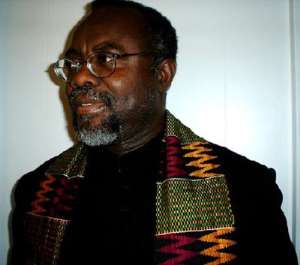
In recent times, much political capital has been made of the perceived underdevelopment of the northern sector of the country. And whenever the issue has been duly raised, the facile tendency has been for the most vociferous critics to point to the supposedly depressing figure of the “Kaya-Yo,” the woman porter, almost as if to suggest that honestly working for one's livelihood were tabooed, particularly since the overwhelming majority of these “Kaya-Ye,” or women porters, are commonly believed to be of northern Ghanaian extraction.
The reality of the situation, however, is that most Ghanaian women, especially those in the farming regions of the country, carry as much load, if not much more, than the so-called Kaya-Ye, who have voluntarily elected to do their load-carriage in the big towns and cities across the country.
The preceding notwithstanding, the problem that appears to require prompt and thorough redressing is that of bureaucratic, or administrative, ineptitude at all levels of governance, particularly in the rural areas. And interestingly, we learn from an article that was recently published by Ghanaweb.com, and originally authored by the Ghana News Agency (GNA), that as of this writing (10/17/07), billions of dollars in donor funds earmarked for infrastructural development, have yet to be accessed by the various local and district administrators of the Northern Region. And since such donor funds are often earmarked for the fiscal year, by the end of the latter period if such funds have not been utilized, they are often redirected to other regions where they are deemed to stand a better chance of being effectively and profitably utilized.
In essence, what the preceding implies is that the perennial and facile notion that most of the northern sector of Ghana, relatively speaking, lags behind the rest of the country in material development largely because of a woeful and, perhaps, even deliberate withholding of public funding, needs to be rethought (see “District Assemblies Fail to Utilize Donor Funds,” Ghanaweb.com 10/17/07). In sum, the Northern Region of Ghana, in this particular context, may be aptly seen, via the evidently gross incompetence of its local administrators, to be the bane of its own woeful underdevelopment.
Consequently, while recently addressing a five-day workshop on “Strategic Management for District Chief Executives,” the Northern Regional Minister, Alhaji Mustapha Ali Idris, had occasion to caution the district administrators against the regressive tendency to glibly blame “the intricacies and complexities of the procurement law” for their own personal and collective incompetence. The implication here, of course, is that the same procurement rules apply all over the country, and since their counterparts in other localities across the country have been able to perform quite effectively under the aegis of the same procurement law, it stood to reason for Alhaji Ali Idris to decry the relative lackluster performance of these northern-regional administrators.
Indeed, it has often been said that “Ideas,” rather than raw “Money,” are the engine of economic growth and development. Of course, the obvious fact of the synergy of progressive ideas and capital spurring the exponential growth of any economy or society can hardly be gainsaid. And so it surely comes as a godsend gesture for the Ghana Institute of Management and Public Administration (GIMPA) to have meaningfully partnered with the Northern Regional Coordinating Council (NRCC) in hosting the managerial workshop.
Our only wonder regards why it took so long for this glaring administrative bottleneck to be unearthed, and then redressed, assuming, of course, that by the end of the five-day workshop, the major participants would have been duly equipped with the requisite skills to enable them to promptly access and productively utilize the humongous donor capital earmarked for the crucial development of that sector of the country.
It is also quite heartening to hear Dr. Stephen Addae, the rector of GIMPA, announce the imminent establishment of satellite campuses of the Ghana Institute of Management and Public Administration in Tamale, Kumasi and Takoradi. One wonders why such critical, developmental incentive could not be readily and promptly extended to all the ten regions of the country.
*Kwame Okoampa-Ahoofe, Jr., Ph.D., is Associate Professor of English and Journalism at Nassau Community College of the State University of New York, Garden City. He is the author of “When Dancers Play Historians and Thinkers,” a forthcoming collection of essays on postcolonial Ghanaian political history. E-mail: [email protected].
########################################




 Minority will expose the beneficial owners of SML, recover funds paid to company...
Minority will expose the beneficial owners of SML, recover funds paid to company...
 Prof. Opoku-Agyemang has ‘decapitated’ the NPP’s strategies; don’t take them ser...
Prof. Opoku-Agyemang has ‘decapitated’ the NPP’s strategies; don’t take them ser...
 Abubakar Tahiru: Ghanaian environmental activist sets world record by hugging 1,...
Abubakar Tahiru: Ghanaian environmental activist sets world record by hugging 1,...
 Prof. Naana Opoku-Agyemang will serve you with dignity, courage, and integrity a...
Prof. Naana Opoku-Agyemang will serve you with dignity, courage, and integrity a...
 Rectify salary anomalies to reduce tension and possible strike action in public ...
Rectify salary anomalies to reduce tension and possible strike action in public ...
 Stop all projects and fix ‘dumsor’ — Professor Charles Marfo to Akufo-Addo
Stop all projects and fix ‘dumsor’ — Professor Charles Marfo to Akufo-Addo
 Blue and white painted schools will attract dirt shortly – Kofi Asare
Blue and white painted schools will attract dirt shortly – Kofi Asare
 I endorse cost-sharing for free SHS, we should prioritise to know who can pay - ...
I endorse cost-sharing for free SHS, we should prioritise to know who can pay - ...
 See the four arsonists who petrol-bombed Labone-based CMG
See the four arsonists who petrol-bombed Labone-based CMG
 Mahama coming back because Akufo-Addo has failed, he hasn't performed more than ...
Mahama coming back because Akufo-Addo has failed, he hasn't performed more than ...
